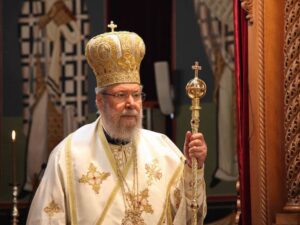The Emmaus sermons I have heard this year have each stressed the importance of the ordinary setting of the story. In fact, more of this could be made than I have heard. These two people going to Emmaus are not described as disciples. The Greek allows that these were possibly even a man and woman, man and wife perhaps since we learn later that they share a home to which they can invite the stranger. Their relation to the eleven is uncertain. They refer to ‘women of ours’ who had been to the tomb and had come back spouting what had been regarded as nonsense. They betray something of their relation to Jesus in that they were among those who had hoped he would be the one who would (literally) liberate Israel (though most versions prefer to translate the Greek as ‘redeem’). These are human feelings, political aspirations, ordinary emotions.
This is still Easter Day. These two are part of the crowds returning from the great feast in Jerusalem. The person who meets with them is described as a paroikos in Greek. This is an interesting term in the New Testament, usually denoting a foreigner who may be just visiting or who may have an official immigrant status. No flocks of angels in this vision then. Just some foreigner choosing to walk with an ordinary couple on their way home, like fans returning from a football match in which their team has lost, and finding common cause with some amateur pundit. And they were surprised.
Because it is ordinary, we can identify with it. It uses themes which are part of our ordinary religious yearning. Perhaps we are among those who have our doubts about the empty tomb story or feel embarrassed by its apparent supernatural demands for faith. Perhaps we are among those who have been disillusioned by religion, perhaps, as the story seems to say, we have hoped for too little. Perhaps our hopes have been too specific, too local, too confined by human vision. Perhaps we have the feeling that we do not understand well enough what is going on.
Perhaps it is the journey theme with which we identify most. Being ‘on a journey’ is a familiar and accessible metaphor for our own development as human beings; our own journey through life, and one which poets and artists have recognized as an important medium of communication. T.S. Eliot’s magi make a journey. They too are surprised by what they find. That too is very ordinary. They too realise that their vision has been too small. As they move on they no longer feel at ease in the old dispensation. The realization of the new is both exhilarating and disturbing.
The author draws our attention to the meal, to the breaking of the bread. This happens, remember, in the company of two people who were not at the last supper, but is reported to us who know what went on. We are invited to join dots while the two people involved simply recognize in that instant. We the readers might, in our own setting, think of the eucharist, of the gathered community of disciples today, of the explanation and ‘breaking’ of the word of the Law the Prophets and now the New Testament. Or we might think of ordinary times when hospitality to a stranger has revealed something important to us.
Having recognized and having understood, we do not want the moment to pass. Abide with us, we ask, and that asking has pastoral strength as demonstrated in the hymn written by a terminally ill cleric reaching the end of his journey, Abide with Me. We pray for reassurance in turbulent times, we pray that in all the situations of loneliness we might imagine (and lock down has emphasized some of them) we should not feel alone.
Ordinariness is a great space in which to rehearse religious yearnings. The priest poet George Herbert spoke in one of his poems, called simply Prayer, of ‘heaven in ordinarie.’ He also had a poem about meeting God and recognizing what God is about in the context of a meal. It begins with an invitation to the reader and through him to us, strangers, to that meal: “love bade me welcome.” The invitee comes up with self-deprecating reasons to refuse. He is not worthy, there are others more deserving, he will come but only if he can serve. Love will have none of it. Love has atoned for all that. It is a post-Easter poem to those on a journey of understanding; those who yearn to recognize God’s presence and hold him; a poem to demolish scepticism and replace it with realistic imagination.
“You must sit down, says Love, and taste my meat:
So I did sit and eat.”
JH



